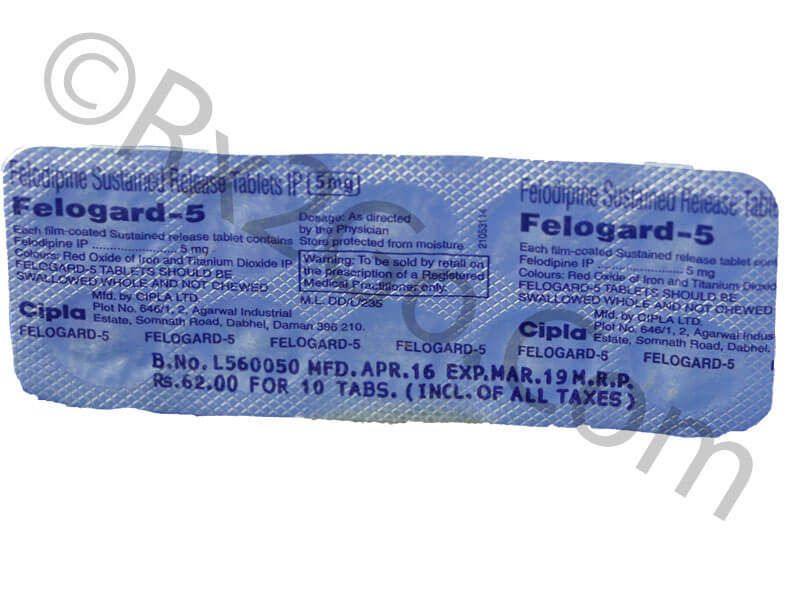Felodipine

Felodipine is a calcium-channel blocker that acts on the blood vessels. It is primarily used for the treatment and management of high blood pressure or hypertension. It is also used to treat patients suffering from angina pectoris or chest pain due to heart disease. It may also be used for purposes as determined by your physician.
High blood pressure is a common condition that affects millions of people around the globe. Its long-term force against the arterial wall can be high enough to cause health problems and even death. Lowering blood pressure helps prevent heart attack, stroke, and kidney problems. Untreated high blood pressure can cause damages to body organs such as the heart, blood vessels, kidney, brain and other vital organs in the body.
High blood pressure is often called a silent killer as most people will not notice any signs of the problems. In fact, many may feel normal. You can have high blood pressure for years without any symptoms. Even without symptoms, damages to your heart and blood vessels continue and can be detected. High blood pressure generally develops over the years and it affects nearly everyone eventually.
Why Buy Felodipine?
Felodipine is an effective anti-hypertensive medication. It’s a good option for people with high blood pressure. It is FDA approved for medical use since 1991. Felodipine affects the movement of calcium into the cells of the blood vessels and the heart, thereby relaxing it and increasing the supply of blood and oxygen to the heart. This reduces the heart’s workload.
How to Take Felodipine?
Felodipine comes in a tablet form for you to take orally. Take one tablet a day on an empty stomach or as directed by your physician. If it makes your stomach upset, take it with a light meal. Your dose may be different from other patients. Your dose will be based on your condition and the severity of your condition. The recommended dose is 2.5 mg to 10 mg a day. Take it at the same time each day. Swallow the tablet whole with plenty of water. Do not chew or crush the tablet. In addition to taking medication, making lifestyle will also help to control your blood pressure. These changes include:
- Dieting
- Low salt and fat intake
- Maintaining a healthy weight
- Exercising at least 30 minutes a day
- Not smoking
- Drinking alcoholic beverages in moderation
High blood pressure often has no symptoms. Continue taking Felodipine even if you feel well. This medicine will help you control your blood pressure but will not cure it. You may need to take this medication for the rest of your life. For a missed dose, take it as soon as you remember. If it is almost time for your next dose, skip it and go back to your usual schedule. Do not take two doses to make up for the missed one.
What are the side effects of Felodipine?
Like any other anti-hypertensive medication, this drug can cause unwanted side effects too. The following side effects may occur during the start of your treatment but may improve after a few days.
- Headache
- Flushing
- Dizziness
- Awareness of heartbeat
- Fatigue
- Ringing in the ears
Other side effects are:
- Low blood pressure
- Fainting
- Increase need to urinate
- Fever
- Erectile dysfunction
- Fainting
- Faster than normal heartbeat
- Rash or itching
- Pain in the muscle or joint
- Disturbances in the gut with signs like vomiting, nausea, constipation and diarrhea
In case of serious side effects seek medical help right away.
We care for your health’s safety
- Do not use this to treat patients with:
- Acute heart failure
- People who are having a heart attack or for those who have had a heart attack in the last month
- Aortic stenosis, a condition where the main artery from the heart becomes narrow making it hard for the blood to flow to the rest of the body.
- An obstructive heart valve
- Obstruction that blocks the flow of blood out of the heart
- Who are pregnant
- Uncontrolled heart failure
- Allergy to other calcium-channel blockers like amlodipine and nifedipine
- Angina pectoris that increases in severity and duration
- Failure of the heart to maintain enough blood circulation (cardiogenic shock)
- Lapp lactase deficiency or glucose-galactose malabsorption
- Use this with care among patients with:
- Decreased liver functions
- History of heart failure or a weak heart particularly on the left ventricle
- Porphyrias, a hereditary blood disorder
- Very fast heart rate
- Elderly people
- Serious defects in the heart’s electrical message pathways can result in decreased heart function.
- Felodipine is not recommended for children
- Felodipine can make you feel dizzy and tired. Take extra care when performing potentially hazardous activities like driving or operating machinery.
- In case of chest pain after taking this medication stop taking any further dose and call your doctor right away.
- Felodipine may pass into breast milk in a small amount. It is recommended not to take this if you are a breastfeeding mother as it can affect newborn babies.
- When taking Felodipine, it is important to inform your doctor if you are taking any other medications as drug interactions may occur including vitamins and herbal supplements. Do not use Felodipine if you are taking Ketoconazole or Itraconazole.
- Check your progress to make sure this medicine is working properly. Check for unwanted side effects too.
- Felodipine may cause fluid retention to some patients. If you experience swelling of the face, hands, arms, leg or feet, weight gain and bloating contact your doctor immediately.



